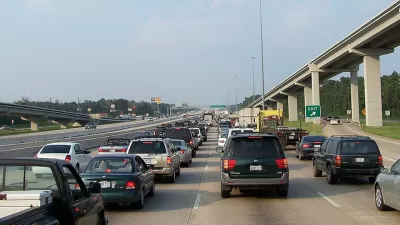In the United States, busy roads shorten lives in more ways than one, but when it comes to the ill effects of noise pollution, almost no efforts are made to reduce the damage.

"A team of Italian researchers found a broad consensus emerge from more than 250 scientific articles: urban noise pollution causes a variety of psychological, cardiovascular, and other health disorders — and the experts estimated that it costs 'at least one million healthy life years' per year across Western Europe," according to an article by Kea Wilson.
While the evidence in the new research doesn't include the American experience, but it's likely that the public health outcomes from noise are worse, because U.S. cities are even louder than European counterparts. "[I]t’s pretty clear we’re suffering too," writes Wilson, "only 65.5 percent of Europeans are routinely exposed to traffic noises above 50 decibels, but 97 percent of Americans live with that level of constant ruckus from our car-dominated road network."
The new study also provides ideas for future research, noting that most studies into the effects of noise pollution focus on air travel, despite the documented ill effects of noise pollution from automobiles.
"That dearth of research might help explain why restrictions on U.S. roadway sound levels are so lax. The Noise Control Act of 1972 authorized the Environmental Protection Agency to advise states on the recommended limits of noise pollution that would caused by their federally-funded road projects — but the responsibility for actually setting noise caps was shifted to the states less than ten years later, when the funding for the federal Office of Noise Abatement was rescinded," explains Wilson. Moreover: "The Federal Highway Administration provides almost no funding for highway noise abatement when it funds new road-building projects, besides a small number of federal dollars for concrete 'noise walls,' which don’t really work."
FULL STORY: The Other Type of Car Pollution That Harms Us All

Planetizen Federal Action Tracker
A weekly monitor of how Trump’s orders and actions are impacting planners and planning in America.

Maui's Vacation Rental Debate Turns Ugly
Verbal attacks, misinformation campaigns and fistfights plague a high-stakes debate to convert thousands of vacation rentals into long-term housing.

Restaurant Patios Were a Pandemic Win — Why Were They so Hard to Keep?
Social distancing requirements and changes in travel patterns prompted cities to pilot new uses for street and sidewalk space. Then it got complicated.

In California Battle of Housing vs. Environment, Housing Just Won
A new state law significantly limits the power of CEQA, an environmental review law that served as a powerful tool for blocking new development.

Boulder Eliminates Parking Minimums Citywide
Officials estimate the cost of building a single underground parking space at up to $100,000.

Orange County, Florida Adopts Largest US “Sprawl Repair” Code
The ‘Orange Code’ seeks to rectify decades of sprawl-inducing, car-oriented development.
Urban Design for Planners 1: Software Tools
This six-course series explores essential urban design concepts using open source software and equips planners with the tools they need to participate fully in the urban design process.
Planning for Universal Design
Learn the tools for implementing Universal Design in planning regulations.
Heyer Gruel & Associates PA
JM Goldson LLC
Custer County Colorado
City of Camden Redevelopment Agency
City of Astoria
Transportation Research & Education Center (TREC) at Portland State University
Jefferson Parish Government
Camden Redevelopment Agency
City of Claremont





























